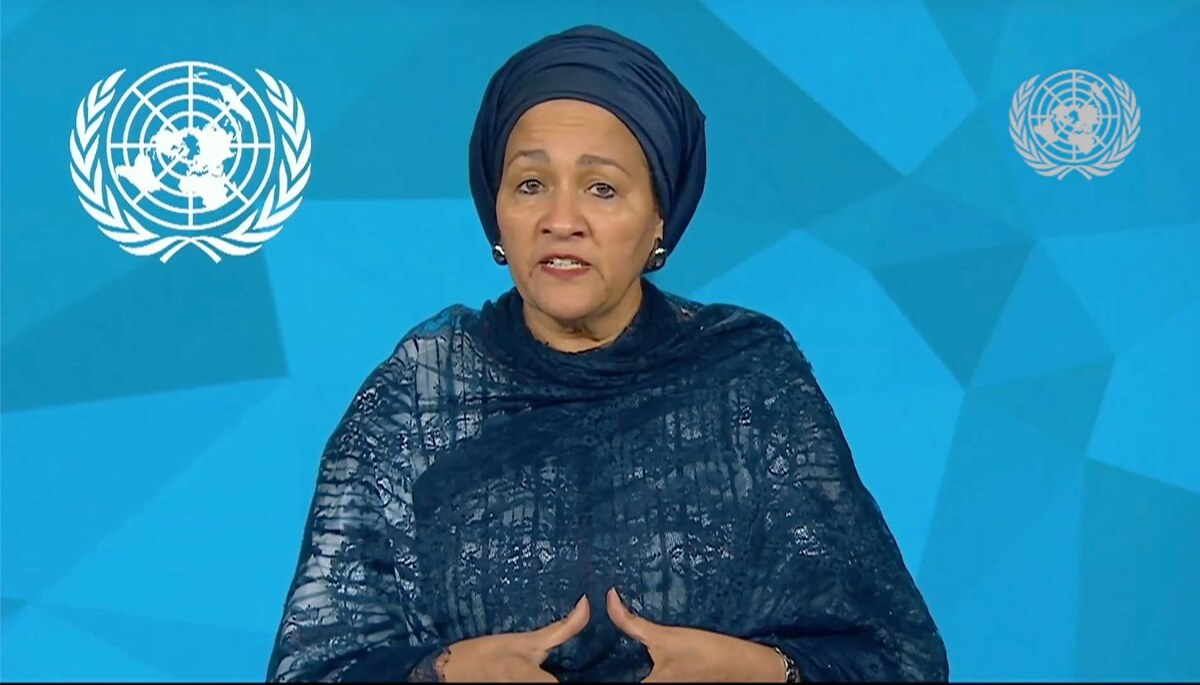RIYADH: Saudi Arabia’s incoming COP16 president vowed to work with the international community to tackle drought and desertification on the first day of a UN conference in Riyadh.
Abdulrahman Al-Fadli, the Kingdom’s minister of environment, used his speech at the event – being held from Dec. 2 to 13 under the theme “Our Land. Our Future” – to reflect on the challenges facing the global community.
Outgoing COP15 president, Côte d'Ivoire’s Alain-Richard Donwahi, handed over leadership of the UN Convention to Combat Desertification with a call for continued urgency, while Ibrahim Thiaw, executive secretary of the UNCCD, warned that close to 40 percent of the planet’s surface is affected by land degradation.
Al-Fadli said he was “honoured” to have been elected president, adding: “We look forward to intensifying action under this convention to face the challenges and promote integration between various international environment organizations.”
Reflecting on the challenges ahead, he emphasized the Kingdom’s commitment to combating desertification, adding: “The Middle East is one of the regions most impacted by land degradation, drought, and desertification. We seek to address environmental challenges in partnership with the international community.”
The environment minister highlighted Vision 2030 as a cornerstone for the Kingdom’s green agenda, saying: “Protecting the environment and natural resources is essential for achieving sustainable development and quality of life.”
Saudi Arabia’s environmental commitment
Al-Fadli detailed the Kingdom’s objectives, including the Saudi Green Initiative, which aims to restore 40 million hectares of degraded land and increase national reserves by 30 percent by 2030.
He added: “We have established initiatives and programs to limit pollution, develop vegetation cover, and improve waste management and meteorological services.”
Addressing broader approaches, Al-Fadli highlighted that Saudi Arabia has adopted the National Environment Strategy and established a fund for environmental causes, as well as five specialized centers.
He underlined efforts in renewable energy: “We aim to ensure more than 50 percent of our energy mix comes from renewable sources by 2030, reducing carbon emissions significantly.”
Global and local perspectives
Mayor of Riyadh Faisal bin Abdul Aziz bin Ayyaf highlighted the interconnected nature of environmental challenges, saying: “No country or city can address these challenges alone. Through international cooperation and collective work, we can find innovative solutions to restore our land and develop our cities.”
He added: “We coordinate initiatives to ensure Riyadh can be a model for the world.”
Amina Mohammed, deputy secretary-general of the UN, called for urgent global action, particularly around strengthening international cooperation on land degradation, ramping up restoration work, and mobilizing finance at scale.
“Land sustains us, and we are destroying it. Action cannot wait,” she said.

Amina Mohammed, deputy secretary-general of the UN. Screenshot
Outgoing president’s reflections
COP15 president Donwahi praised Saudi Arabia’s capability to continue the battle against land degradation, saying there is no doubt in the Kingdom’s ability to “elevate our shared legacy even further” as it stands at the forefront of challenges such as sandstorms and drought.
Stressing the ongoing nature of the mission, he said: “We have remained optimistic. However, the situation remains urgent. We must go further and faster.”
Donwahi acknowledged the progress made by previous COPs, particularly the inclusion of youth, saying: “For the first time, we have appointed a special youth envoy, a strong symbolic gesture that demonstrates our commitment to young people.”
International collaboration
Ibrahim Thiaw, executive secretary of the UNCCD, used his speech to warn that close to 40 percent of the planet’s surface is affected by land degradation.
“This disease is progressing at a terrifying pace,” he added.
Thiaw expressed his “deepest gratitude” to Saudi Arabia for its “vision in elevating the global land restoration and drought resilience agenda.”
The conference also looked ahead to COP17 in Mongolia, with Prime Minister Luvsannamsrain Oyun-Erdene expressing his country’s readiness.



























